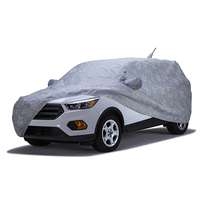
Caring for your non-operating vehicle
Caring for a car you don’t drive means taking a number of steps, none of them terribly difficult.
The first issue to address is the battery. Either remove it from the vehicle or get a battery tender to keep it charged up. The electronics in today’s vehicle drain the battery even when a car or truck is not running. Leaving the battery unattended will certainly result in it going dead.
Tires. They’ll develop flat spots if you don’t rotate them occasionally. You can either drive the vehicle around the block each week, a good practice, or you can pull the wheels and store them. Driving is the best option for the sake of the entire vehicle, as it will keep seals and gaskets from drying out, something permanent storage techniques won’t prevent.
A cover is absolutely vital, of course, as it will keep dust and dirt off, protecting your paint, which is sometimes the most expensive item on your car to have redone. You’ll need a waterproof one if you’re keeping your car outdoors. Be sure, though, that condensation doesn’t collect underneath the cover. Check on this at least once a week. Constant moisture will soften paint.
~
If you are storing your car indoors, you have a wider choice of covers. The softer the cover the better is one rule to follow. Also, make sure the cover does not stretch tightly at the corners of your vehicle. This is where rub marks can occur. Better to have the cover too loose than too tight. Indoors, you don’t have to worry about wind blowing the cover off. So, you can get a cover that isn’t necessarily form fitting.
If you are storing outdoors, make sure the exhaust pipe is covered to prevent rats, mice, and other small creatures from taking up residence there. Don’t forget, too, to remove that cover when you go start up your vehicle.
One thing to consider is a non-operational registration with your state’s DMV if you are going to put your car up on blocks and keep it there. The registration will be much lower as a non-op and so will your insurance. If you plan to drive it a few times a month this won’t be possible, of course, but it is something for many to consider.
For very long storage, draining fluids like anti-freeze and brake fluid are things to carefully consider. Some fluids turn to sludge over time when they are not in use. Consult your mechanic on what fluids may need to be drained for your particular vehicle.
